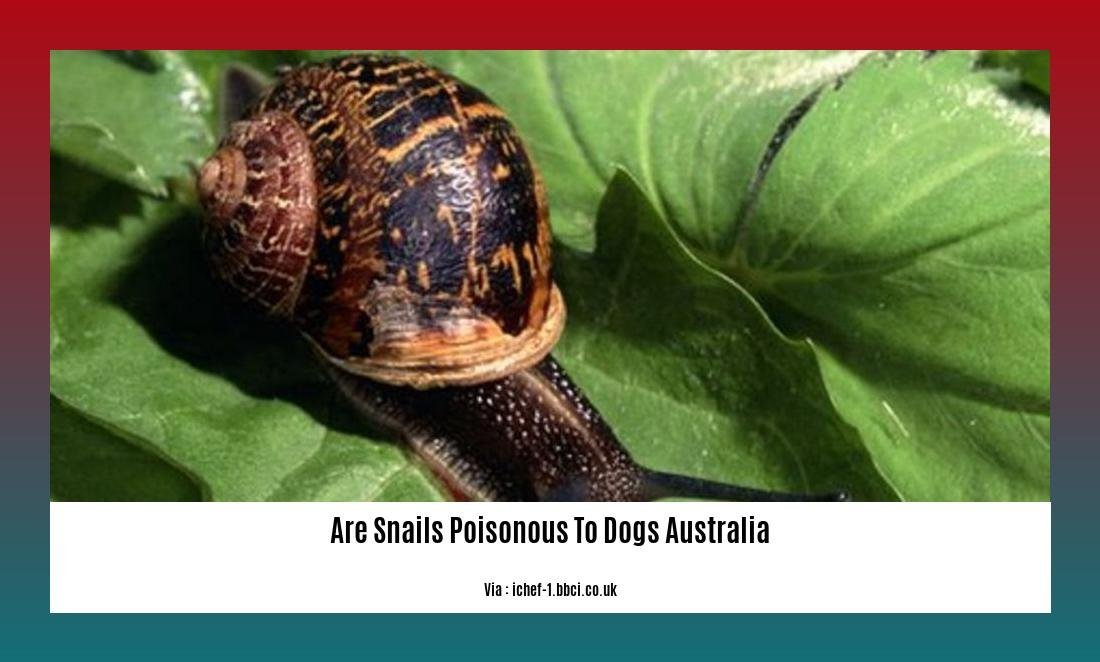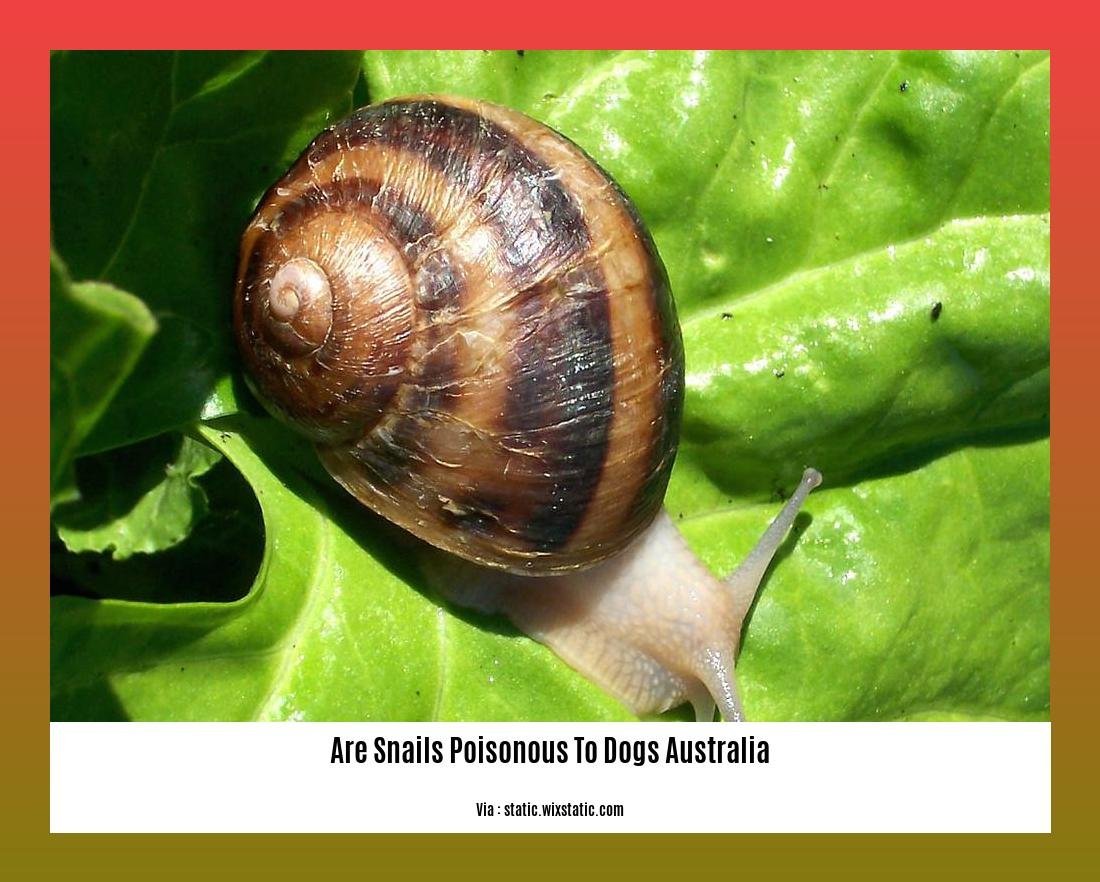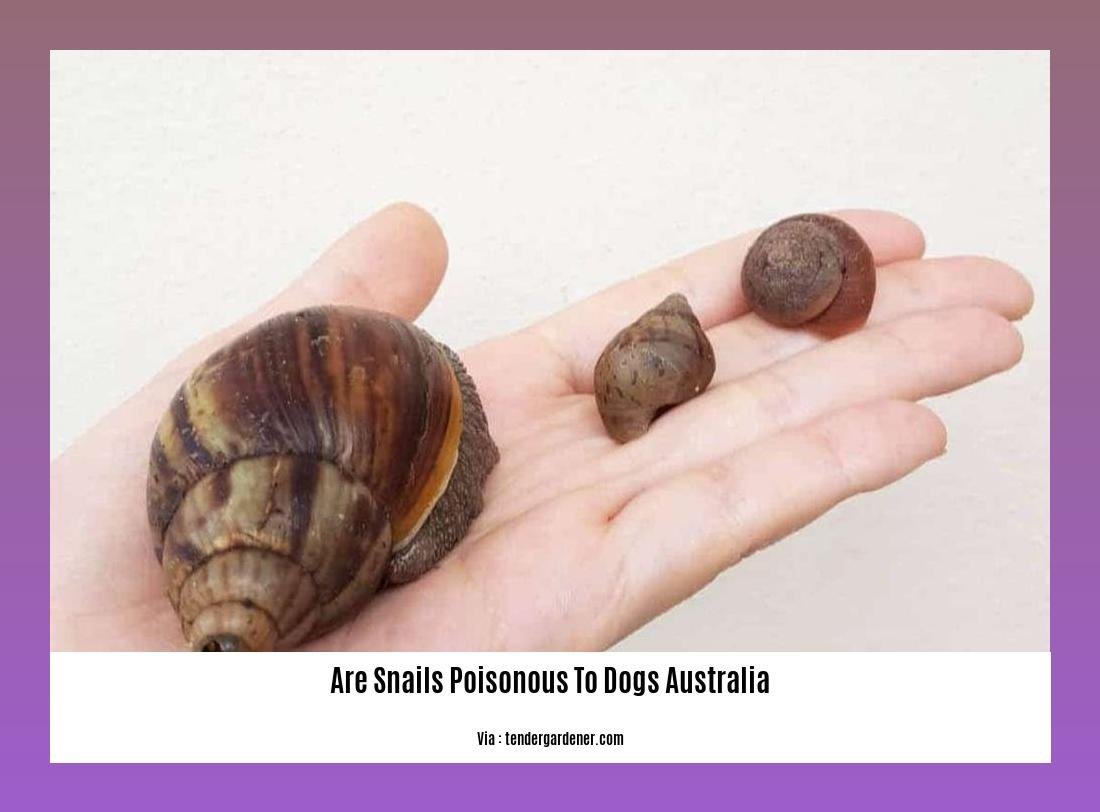Are Snails Poisonous to Dogs in Australia? Exploring the Potential Risks and Protective Measures.
Curiosity is an innate trait in dogs, and their naturally inquisitive nature can lead them to encounter various hazards in their environment. As a responsible dog owner in Australia, it is essential to be aware of the potential risks posed by seemingly harmless creatures like snails. While snails may appear harmless, they can carry parasites and produce toxic substances that can be harmful or even fatal to our canine companions. In this article, we delve into the subject of whether snails are poisonous to dogs in Australia, exploring the potential dangers they can pose and discussing the necessary preventative measures to keep our furry friends safe.
Key Takeaways:
- Snails themselves are not poisonous to dogs, but they can carry harmful parasites and bacteria.
- The parasite lungworm can be transmitted to dogs through contact with snails, causing severe harm to their health.
- Snails can also carry diseases such as rat lungworm disease and salmonella, which can make dogs ill.
- While most snails are harmless, it is best to avoid letting your dog eat snails and to monitor them for signs of illness if they do.
- It is important to contact a veterinarian if you have concerns about your dog’s health after contact with snails.
Are Snails Poisonous to Dogs in Australia? Exploring the Potential Risks and Protective Measures

Snails may seem harmless, slowly making their way through our gardens or along the sidewalks. But when it comes to our furry friends, are snails poisonous to dogs in Australia? While snails themselves may not pose a direct poison threat, they can still bring potential risks and danger to our canine companions. In this article, we’ll delve into the dangers that snails can present to dogs in Australia and the measures you can take to protect your beloved pets.
Understanding the Potential Risks
It’s essential to recognize that snails can carry certain parasites and diseases that have the potential to harm dogs. One common parasite is lungworm, which can cause severe illness if ingested by your dog. These parasites can be transmitted when dogs come into contact with snails or snail slime, whether through direct ingestion or by exploring areas where snails have left their mark.
In Australia, there are also specific types of snails that can be poisonous to dogs if consumed. While most snails are harmless, it’s crucial to be aware of the potential dangers that some species may pose to your furry friend.
Signs and Symptoms to Watch Out For
If your dog has ingested snails or is showing symptoms of illness, it’s important to be attentive and watchful for any signs of potential poisoning. The symptoms can vary depending on the specific parasite or disease that the snail may have transmitted to your dog.
Common signs of snail-related illness in dogs can include:
- Coughing or difficulty breathing
- Lethargy or weakness
- Loss of appetite
- Vomiting or diarrhea
- Weight loss
- Changes in behavior or mood
If you notice any of these symptoms or suspect that your dog may have ingested snails, it’s essential to contact your veterinarian promptly. They can provide proper guidance and recommend the necessary steps to ensure your dog’s health and well-being.
Preventive Measures for Protecting Your Dog
To mitigate the potential risks associated with snails, there are several precautionary measures you can take to protect your dog and keep them safe:
Limit Access to Snails: The best way to prevent your dog from encountering snails is to restrict their access to areas where snails are commonly found. Regularly inspect your backyard or garden, removing any snails or snail habitats, and secure any potential entry points into these areas.
Supervise Outdoor Activities: When spending time outdoors with your dog, keep a close eye on them to prevent them from inadvertently ingesting snails or coming into contact with snail slime.
Keep Your Dog’s Living Environment Clean: Regularly clean and maintain your dog’s living area, ensuring that it remains free from snails or any potential snail residue.
Use Effective Parasite Prevention: Consult with your veterinarian to establish a regular parasite prevention plan for your dog. This may include regular deworming medication to protect against parasites like lungworm.
Seeking Professional Guidance
While this article provides an overview of the potential risks that snails can pose to dogs in Australia, it is essential to consult with a veterinarian for personalized advice and guidance. They can assess your dog’s specific needs and recommend the most effective preventive measures to ensure their safety and well-being.
Remember, even though snails themselves may not be poisonous to dogs, it’s crucial to stay vigilant and take the necessary steps to protect our beloved furry friends from any potential harm they may bring. By understanding the risks, keeping a watchful eye, and following preventive measures, you can help keep your dog safe and healthy.
Are snails good for your pond? Find out here.
Learn more about trapdoor snails and their benefits for your pond.
are trapdoor snails good for pond
Discover why turtles may not be a good addition to your pond ecosystem.
Find out how garden snails can be beneficial for your garden and pond.
Symptoms of Snail Poisoning in Dogs
If you suspect that your dog has ingested a poisonous snail, it is crucial to seek immediate veterinary care to ensure their well-being. Snail poisoning can lead to severe symptoms such as:
- Vomiting: A dog who has consumed a toxic snail may experience episodes of vomiting.
- Diarrhea: Diarrhea is another common symptom of snail poisoning in dogs.
- Excessive Drooling: If your dog is excessively drooling or has excessive saliva, it could be a sign of snail poisoning.
- Seizures: Snail poisoning can cause seizures in dogs, which can be a distressing and dangerous symptom.
- Paralysis: In some cases, snail poisoning can lead to paralysis in dogs.
It is crucial to be aware of these symptoms and act swiftly to prevent any further complications. Failure to treat snail poisoning promptly can result in fatality for your beloved pet.
What You Should Know About Snail Poisoning
While snails themselves are not poisonous to dogs, they can carry parasites and bacteria that could harm your pet’s health. It is important to understand the risks associated with snail poisoning and take necessary precautions to prevent your dog from ingesting snails.
Some essential information to keep in mind includes:
- Snails can carry parasitic organisms that can cause health issues when ingested by dogs.
- Snail baits containing toxic substances like metaldehyde can be extremely harmful to dogs if consumed.
- It is crucial to keep your dog away from areas where snails are commonly found, such as gardens or outdoor spaces with high snail populations.
- Regularly clean and inspect your dog’s environment to remove any snails or snail trails.
- Practice good hygiene by washing your hands after handling snails or being in areas where snails are present.
Seek Veterinary Care
If you suspect that your dog has ingested a poisonous snail or is showing symptoms of snail poisoning, it is crucial to seek veterinary care immediately. Your veterinarian will be able to provide a proper diagnosis and recommend appropriate treatment for your dog’s specific situation.
Remember, only a qualified veterinarian can assess the severity of the poisoning and provide the necessary medical attention to ensure your dog’s well-being.
Key Takeaways:

- Snail poisoning in dogs can lead to severe symptoms such as vomiting, diarrhea, excessive drooling, seizures, and paralysis.
- Snails themselves are not inherently poisonous to dogs, but they can carry parasites and bacteria that can harm your pet’s health.
- To prevent snail poisoning, keep your dog away from areas with high snail populations and regularly clean their environment.
- If you suspect snail poisoning, seek immediate veterinary care to ensure your dog’s well-being and prevent any further complications.
References:
- Pet Help Reviews UK. Are Snails Bad for Dogs?
- Preventive Vet. Snail & Slug Bait – Poisonous For Pets
Preventive Measures to Protect Dogs from Snail Poisoning
When it comes to keeping our furry friends safe, it’s essential to be aware of the potential risks they may encounter. While snails themselves are not poisonous to dogs, the substances associated with them can be harmful if ingested. In this article, we will explore the preventive measures you can take to protect your dog from snail poisoning.
The Risks of Snail Poisoning
Snails can carry parasites and bacteria that can harm dogs if consumed. While not all snails are dangerous, it’s important to be cautious and take necessary precautions to minimize the risks. Familiarizing yourself with the potential dangers and symptoms of snail poisoning is crucial in ensuring your dog’s well-being.
Preventive Measures
To protect your furry friend from snail poisoning, consider the following preventive measures:
Minimize Snail Presence: One of the most effective ways to prevent snail poisoning is by minimizing the number of snails in your yard. Regularly inspect your outdoor space and remove any snails or snail trails you come across.
Pet-Safe Methods: When dealing with snail control in your yard, opt for pet-safe options. Avoid using toxic snail baits that contain substances like metaldehyde, as they can be extremely dangerous if ingested by dogs.
Training your Dog: Teach your dog the “leave it” command to discourage them from eating snails. This command helps redirect their attention and ensures they avoid potentially harmful substances.
Parasite Prevention: Snails can carry lungworm, which can be harmful to dogs if ingested. Ensure your dog is on a preventative medication specifically designed to protect against lungworm if you have snails in your yard.
Symptom Recognition: Familiarize yourself with the symptoms of snail poisoning, such as vomiting, diarrhea, excessive drooling, seizures, and paralysis. If you notice any of these signs, it’s important to seek immediate veterinary evaluation.
Key Takeaways:
- Snails themselves are not typically poisonous to dogs, but they can carry parasites and bacteria that can be harmful if consumed.
- Minimize the presence of snails in your yard to prevent your dog from encountering them.
- Use pet-safe methods to control snails in your yard and avoid toxic snail baits.
- Train your dog to respond to the “leave it” command to discourage them from eating snails.
- Ensure your dog is on a preventative medication for lungworm if you have snails in your yard.
- Be vigilant in recognizing symptoms of snail poisoning and seek immediate veterinary care if necessary.
Cuteness – How to Stop A Dog From Eating Snails
Dogster – Are Snails Poisonous to Dogs?
What to Do If Your Dog Ingests a Snail
When it comes to our furry friends’ safety, it’s crucial to be aware of the potential dangers they could encounter. One lesser-known risk that dog owners in Australia should consider is the ingestion of snails. While snails themselves are not poisonous to dogs, they can carry parasites and bacteria that can harm our pets’ health. In this article, we will explore the potential risks of snail ingestion and discuss the preventive measures that can be taken to safeguard our beloved canines.
Are Snails Bad for Dogs?
Snails are not inherently poisonous to dogs; however, they can pose risks due to the parasites and bacteria they carry. It is important to prevent your dog from coming into contact with snails to avoid potential health issues [^1].
How to Prevent Snails and Minimize Risks
To minimize the risks of snail poisoning, follow these guidelines:
- Keep your dog away from areas where snails are commonly found, such as gardens or outdoor spaces with high snail populations.
- Regularly clean and inspect your dog’s environment to remove any snails or snail trails.
- Maintain good hygiene practices by regularly washing your hands after handling snails or being in areas where snails are present [^2].
How to Identify Snail Poisoning and Seek Treatment
If you suspect that your dog has ingested a poisonous snail, it is vital to recognize the symptoms and seek veterinary care immediately. Common symptoms of snail poisoning include vomiting, diarrhea, excessive drooling, seizures, and paralysis [^1]. These symptoms can escalate rapidly and lead to fatality if left untreated. Therefore, it is important to act swiftly and What to do if your dog ingests a snail is to consult a veterinarian for proper diagnosis and treatment.
Snail Bait Poisoning: A Serious Concern
Some snail baits contain toxic substances like metaldehyde, which can be extremely harmful to dogs [^4]. If a dog consumes a bait containing metaldehyde, urgent veterinary evaluation is necessary as it can cause severe symptoms, including vomiting and neurological issues.
Key Takeaways:
- Snails themselves are not poisonous to dogs, but they can carry parasites and bacteria that can harm their health [^1].
- Prevent snail ingestion by keeping your dog away from areas with high snail populations and regularly cleaning their environment [^2].
- Be vigilant for symptoms of snail poisoning, such as vomiting, diarrhea, excessive drooling, seizures, and paralysis, and seek immediate veterinary care if necessary [^1].
- Metaldehyde-based snail baits can be extremely dangerous if ingested by pets, so avoid using them [^4].
References:
[^1]: Pet Help Reviews UK. Are Snails Bad for Dogs?
[^2]: AnimalWised. What Happens if My Dog Eats a Snail? – Are Snails Poisonous to Dogs?
[^4]: The Puppy Mag. 6 Snails That Are Dangerous to Dogs (With Photos)
FAQ
Q1: Are all snails poisonous to dogs in Australia?
A1: No, not all snails are poisonous to dogs in Australia. While snails themselves are not toxic, they can carry parasites and bacteria that can harm dogs if ingested.
Q2: What are the potential risks of dogs ingesting snails in Australia?
A2: Dogs ingesting snails in Australia can be at risk of lungworm infestation, as snails can carry lungworm larvae. Additionally, snails can harbor diseases and bacteria such as rat lungworm disease and salmonella, which can cause illness in dogs.
Q3: What are the symptoms of snail poisoning in dogs?
A3: Symptoms of snail poisoning in dogs may include vomiting, diarrhea, excessive drooling, seizures, and paralysis. These symptoms can escalate quickly and may lead to fatality if left untreated.
Q4: How can I prevent my dog from ingesting snails in Australia?
A4: To prevent your dog from ingesting snails in Australia, you can minimize the number of snails in your yard, use pet-safe options to remove snails, teach your dog the “leave it” command, and ensure your dog is on a preventative medication for lungworm if snails are present in your area.
Q5: What should I do if I suspect my dog has ingested a poisonous snail in Australia?
A5: If you suspect that your dog has ingested a poisonous snail in Australia, it is crucial to seek immediate veterinary care. The veterinarian can provide proper diagnosis and treatment to ensure your dog’s well-being.
- Sept 31 Myth: Unveiling Calendar Secrets - March 18, 2025
- How Long & Till December 18, 2025: Accurate Countdown Guide - March 18, 2025
- Discover Japanese Artists: A Complete History - March 18, 2025
















